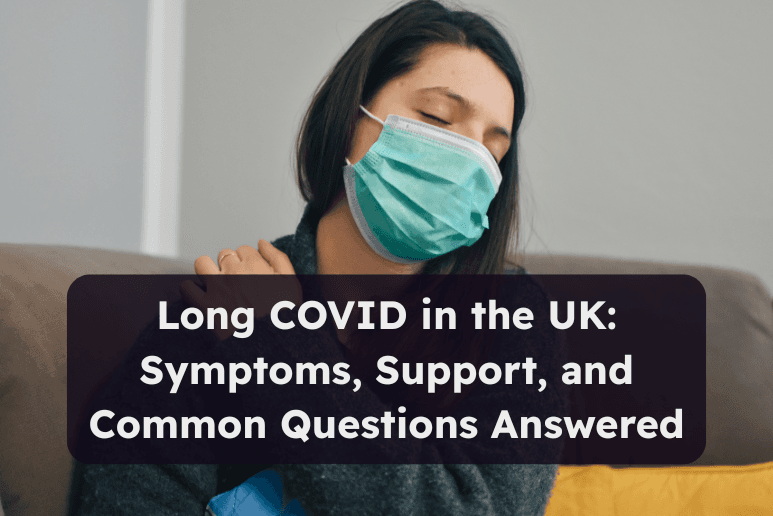All Articles
3 min read
Long COVID in the UK: Symptoms, Support, and Common Questions Answered
Written by
Purpl
Published on
September 8, 2025

Long COVID is one of the toughest legacies of the pandemic. For many people, symptoms don’t stop after the first infection — they continue for weeks or months, and in some cases become disabling. The NHS now recognises it as a condition, and thousands of people across the UK are seeking diagnosis, treatment, and support.
If you’re struggling with lasting symptoms, this guide explains what Long COVID means, how to recognise it, and where you can find help.
At a Glance
- What it is: Long COVID is when symptoms last for more than four weeks after contracting the infection.
- Who it affects: Anyone can develop it, even after a mild case of COVID-19.
- Common symptoms: Fatigue, breathlessness, brain fog, joint pain, and sleep problems.
- Support available: NHS clinics, peer groups, benefits guidance, and workplace rights.
In this Article
- What is Long COVID?
- Common Symptoms
- Questions People Often Ask
- Support and Resources
- Living with Long COVID
What is Long COVID?
It refers to symptoms that continue for more than four weeks after catching COVID-19. While most people recover within two weeks, others are left with long-lasting effects that impact energy levels, breathing, memory, and daily life.
Research suggests that it can affect anyone — even those who had mild initial symptoms. It can cause inflammation, nerve issues, and ongoing fatigue that disrupts work, relationships, and wellbeing.
Common Symptoms
Symptoms can vary from person to person, but the most commonly reported include:
- Severe tiredness or fatigue
- Brain fog, poor memory or difficulty concentrating
- Breathlessness or chest pain
- Ongoing cough or loss of taste/smell
- Headaches or dizziness
- Joint pain and muscle aches
- Sleep disturbances and anxiety
If these symptoms persist, speak to your GP about NHS Long COVID services.
Questions People Often Ask
How long does it take for COVID symptoms to show?
Symptoms usually appear 2–14 days after infection, most often around day 4 or 5. Testing can help confirm infection before symptoms get worse.
How long are you contagious with COVID?
Most people are contagious for 5–10 days from the start of symptoms. Some people may remain infectious longer, especially if they have weaker immune systems. Staying home during this time helps protect others.
How long does the COVID vaccine last?
The vaccines provide strong protection against serious illness, but immunity fades over time. That’s why the NHS recommends booster doses — especially for disabled or clinically vulnerable people. You can check when you’re due a booster on the NHS vaccine advice page.
Where can I get a COVID test kit now?
Free tests aren’t as widely available as before, but you can buy test kits at pharmacies, supermarkets, or online. If you have certain medical conditions, or are being admitted to hospital, you may still qualify for free NHS tests.
Support and Resources
If you think you might have Long COVID, support is available:
- NHS Long COVID Services – Ask your GP for a referral to a dedicated clinic.
- Peer Support Groups – Join communities like Long COVID Support and Asthma + Lung UK to connect with others.
- Benefits Help – Long COVID can be considered a disability under the Equality Act. You may be eligible for PIP or other benefits. Citizens Advice – Disability and Benefits
- Workplace Rights – Employers are legally required to make reasonable adjustments for people with Long COVID. ACAS Guidance
Living with Long COVID
Living with Long COVID can be exhausting, both physically and emotionally. Small adjustments, pacing yourself, and leaning on supportive communities can make recovery more manageable. Prioritise rest, hydration, and gradual activity — and seek medical advice if symptoms worsen.
If Long COVID has affected your finances, Purpl can help reduce everyday costs. Our members get access to hundreds of discounts on essentials, mobility aids, travel, and wellbeing products — helping you focus on recovery without the added stress of expenses.
Follow @Purpldiscounts on social media for the latest disability discounts, financial advice, and accessibility resources.
Other articles, or links, you might find useful:
Reiki, Meditation, Disability and Me
How My MS Journey Led to Founding a Charity
Is MS Considered a Disability in the UK?
My Journey with Antiphospholipid Syndrome
